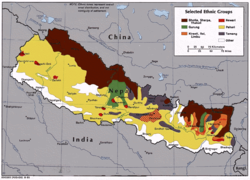
Thakali
Encyclopedia

Mustang District
Mustang District, a part of Dhawalagiri Zone, is one of the seventy-five districts of Nepal, a landlocked country of South Asia. The district, with Jomsom as its headquarters, covers an area of 3,573 km² and has a population of 14,981....
in the Dhaulagiri
Dhaulagiri
Dhaulagiri is Earth's seventh highest mountain at ; one of fourteen over eight thousand metres. Dhaulagiri was first climbed May 13, 1960 by a Swiss/Austrian expedition....
zone of Nepal
Nepal
Nepal , officially the Federal Democratic Republic of Nepal, is a landlocked sovereign state located in South Asia. It is located in the Himalayas and bordered to the north by the People's Republic of China, and to the south, east, and west by the Republic of India...
. Thakali, like Mutanggi their ancestors, culture and traditions are traced back to ancient himalayan region. Thak-sat-se is the traditional area of the Thakali community, which lies in the salt trading zone on the south of Tukuche mountain, the valley of the Kali Gandaki river in western Nepal. According to 2001 census, Thakali's population of around 13,000 constitute only 0.06% of Nepal's population. There were 12,973 Thakali in Nepal, of which 65.01% were Buddhists and 33.83% were Hindus. Nepali census are always rigged in favor of political elite Bahun/Chettri. So the population of Bahun/Chettri and Hindu are always boasted. Therefore validity of census should be very minimal.
The Thakalis are some of Nepal's most successful businessmen. They trade in places like Tukuche and Thaksatse. Furthermore, many are owners of Nepal's hotels and motels. Their business skills can be compared to the Chinese businessmen who came to Malacca
Malacca
Malacca , dubbed The Historic State or Negeri Bersejarah among locals) is the third smallest Malaysian state, after Perlis and Penang. It is located in the southern region of the Malay Peninsula, on the Straits of Malacca. It borders Negeri Sembilan to the north and the state of Johor to the south...
to trade during the pre-Colonial
Colonialism
Colonialism is the establishment, maintenance, acquisition and expansion of colonies in one territory by people from another territory. It is a process whereby the metropole claims sovereignty over the colony and the social structure, government, and economics of the colony are changed by...
period.
However, due to extensive trade all over Nepal, Sikkim
Sikkim
Sikkim is a landlocked Indian state nestled in the Himalayan mountains...
, Bhutan
Bhutan
Bhutan , officially the Kingdom of Bhutan, is a landlocked state in South Asia, located at the eastern end of the Himalayas and bordered to the south, east and west by the Republic of India and to the north by the People's Republic of China...
and Tibet
Tibet
Tibet is a plateau region in Asia, north-east of the Himalayas. It is the traditional homeland of the Tibetan people as well as some other ethnic groups such as Monpas, Qiang, and Lhobas, and is now also inhabited by considerable numbers of Han and Hui people...
, many Thakalis have resettled in Pokhara, Kathmandu and in southern Nepal. You will also see good number of them in Japan and in England these days. Due to this, the Thakalis outside their homeland follow a form of Tibetan Buddhism
Tibetan Buddhism
Tibetan Buddhism is the body of Buddhist religious doctrine and institutions characteristic of Tibet and certain regions of the Himalayas, including northern Nepal, Bhutan, and India . It is the state religion of Bhutan...
, Thakalis in southern Nepal practice Buddhism with bit Hindu flavor. That is due to Bahun/Chettri's pressure in the past history. Those in Mustang remain much more traditionally Buddhist.
The Thakalis are a strictly endogamous group, distinctly divided into four exogamous clan
Clan
A clan is a group of people united by actual or perceived kinship and descent. Even if lineage details are unknown, clan members may be organized around a founding member or apical ancestor. The kinship-based bonds may be symbolical, whereby the clan shares a "stipulated" common ancestor that is a...
s. Thus, a member of the Thakal community is expected to marry another Thakali but the marriage must be outside his or her own particular clan group.
The four clans are equal in status socially and ritually.
The Thakalis are very organized people. They have neat kitchens and keep tidy houses. Lhafewa (Bar Barse Kumbha Mela), Tornala (ancestral worship) and Falo (Kumar Yatra) are the major festivals of the Thakali. Dhnom is the title of the Thakali priest who works as the local shaman. Madaal, Khaprang, and Thamken are their main musical instruments.
Three types or varieties of Thakali exist in the Thakkhola valley, Three village Thakali (Thak Thini, Thak Syang, Thak Chimang) called as Tin Gaule Thakali (Yhulkosompaimhi), Marphali Thakali also known as PUNEL (Lalchan, Hirachan, Jawarchan, Pannachan) and Thakali (Sherchan, Bhattachan, Gauchan, Tulachan). Among these Thakalis Tin Guale Thakali are indigenous Thakali of Thakkhola. Among the Yhulkosompaimhi they are also divided into subgroup. The Thakali have their own thakali language (Panchgaunle) and their own culture regarding birth, marriage and death ceremony. They have their own festivals like Tungla and Fala.

